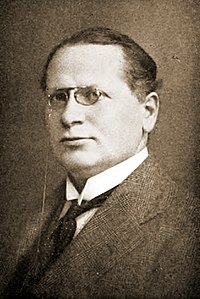Maxim Litvinov
| Maxim Litvinov Макси́м Литви́нов |
|
|---|---|
 |
|
| Soviet Ambassador to the United States | |
|
In office 10 November 1941 – 22 August 1943 |
|
| Premier |
Vyacheslav Molotov Joseph Stalin |
| Preceded by | Konstantin Umansky |
| Succeeded by | Andrei Gromyko |
|
In office 1918–1919 |
|
| Premier | Vladimir Lenin |
| Preceded by | Boris Bakhmeteff |
| Succeeded by | Ludwig Martens |
| People's Commissar for Foreign Affairs of the Soviet Union | |
|
In office 21 July 1930 – 3 May 1939 |
|
| Premier | Vyacheslav Molotov |
| Preceded by | Georgy Chicherin |
| Succeeded by | Vyacheslav Molotov |
| Personal details | |
| Born |
Meir Henoch Mojszewicz Wallach-Finkelstein 17 July 1876 Białystok, Russian Empire |
| Died | 31 December 1951 (aged 75) Moscow, Russian SFSR, Soviet Union |
| Nationality | Soviet |
| Political party | All-Union Communist Party (bolsheviks) |
| Profession | Diplomat, civil servant |
Maxim Maximovich Litvinov (Russian: Макси́м Макси́мович Литви́нов, Russian pronunciation: [mɐˈksʲim mɐˈksʲiməvʲɪtɕ lʲɪˈtvʲinəf]; born Meir Henoch Wallach-Finkelstein (17 July 1876 – 31 December 1951) was an ethnic Jewish Russian revolutionary and prominent Soviet diplomat.
A strong advocate of diplomatic agreements leading towards disarmament, Litvinov was influential in making the Soviet Union a party to the Kellogg-Briand Pact of 1928 and was chiefly responsible in 1929 for adoption of the so-called , a multilateral agreement bringing Kellogg-Briand into force between the USSR and a number of neighboring states. In 1930 Litvinov was named as People's Commissar of Foreign Affairs, the top-ranking diplomatic position in the Soviet state. During the subsequent decade, Litvinov emerged as a leading voice for the official Soviet policy of collective security.
In May 1939 Litvinov was sacked because he did not believe the West was serious about confronting Hitler and was replaced with Vyacheslav Molotov, who had to continue negotiations about an anti-Hitler alliance. Litvinov survived the Great Purge and war and a new round of anti-Jewish repression in the postwar years, dying a natural death in the USSR in 1951.
Meir Henoch Wallach-Finkelstein was born into a wealthy Lithuanian Jewish banking family in Białystok, Grodno Governorate of the Russian Empire, formerly part of the Polish-Lithuanian Commonwealth, he was the second son of Moses and Anna Wallach. He joined the Russian Social Democratic Labour Party (SDLP) in 1898 at which time the party was considered an illegal organization, and it was customary for its members to use pseudonyms. He changed his name to Maxim Litvinov (a common Litvak surname), but was also known as Papasha and Maximovich. Litvinov also wrote articles under the names M.G. Harrison and David Mordecai Finkelstein.
...
Wikipedia
